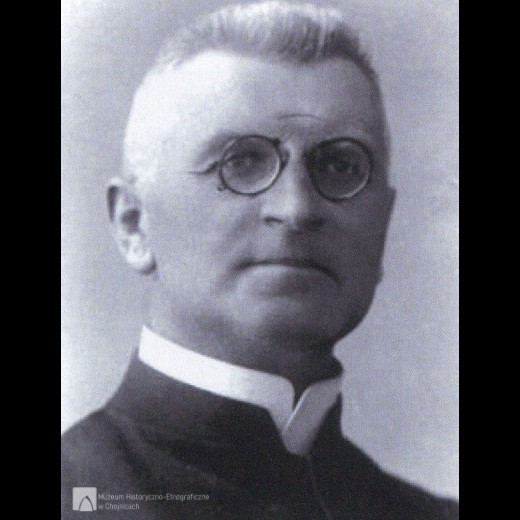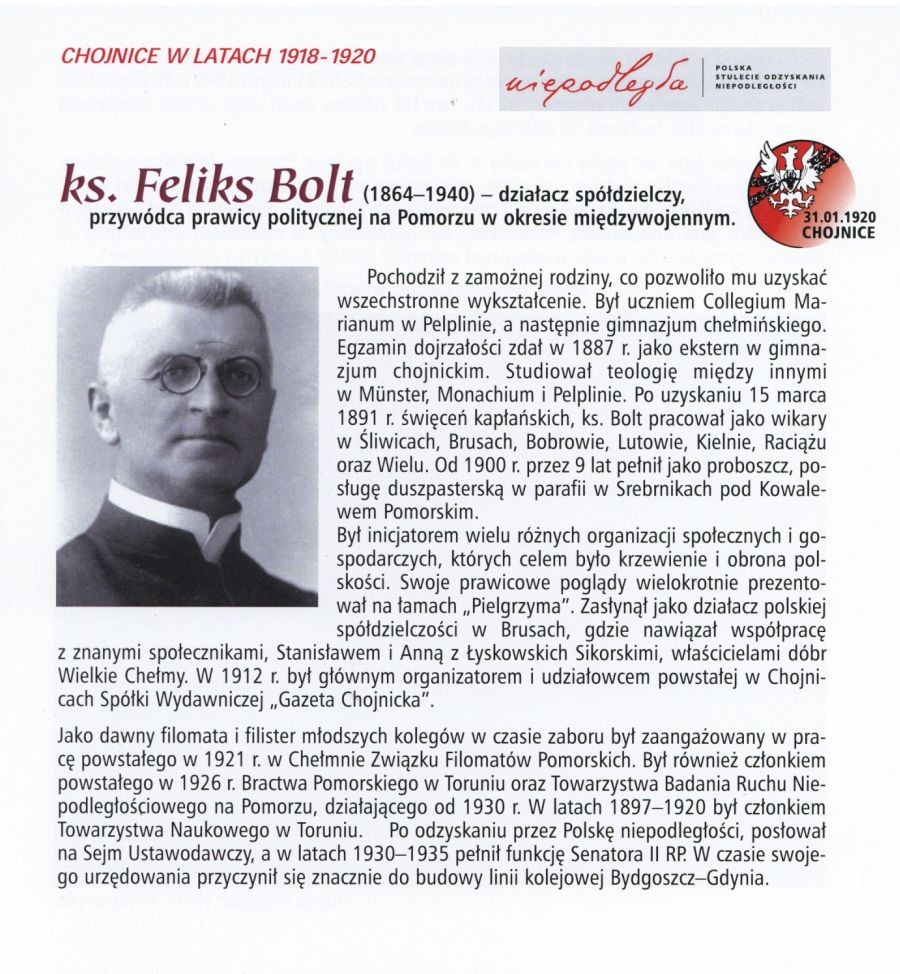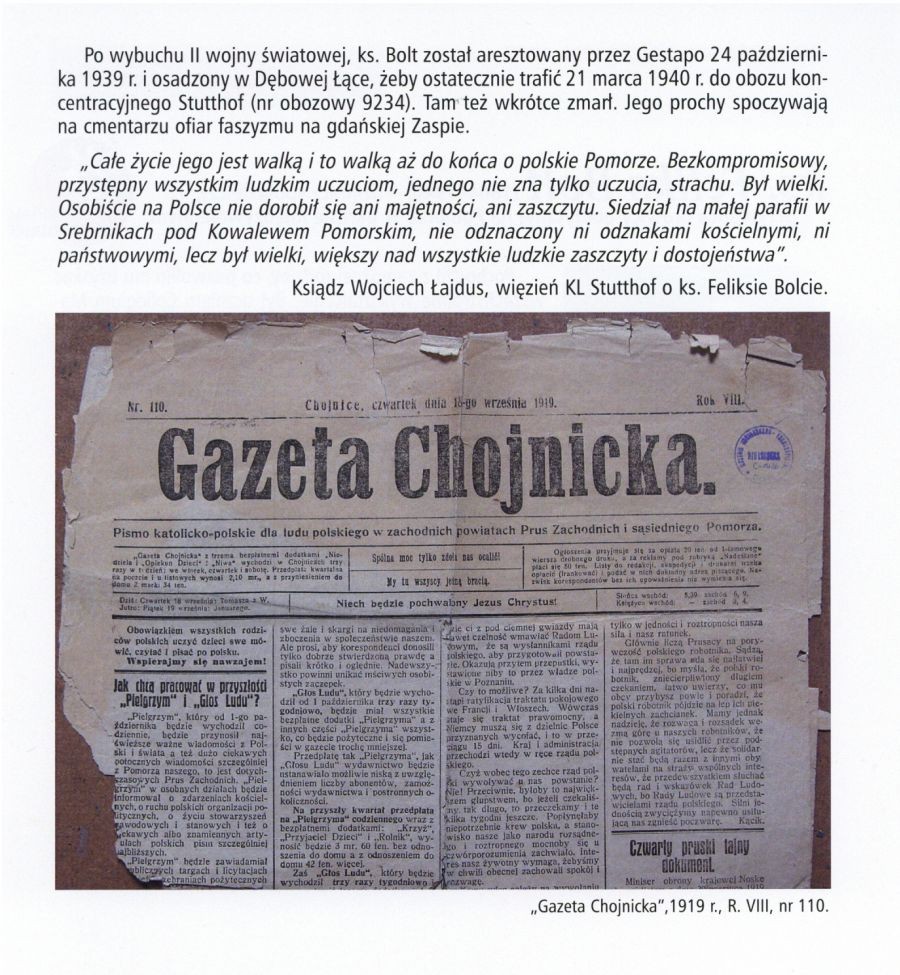
Father Feliks Bolt (1864-1940), cooperative activist, leader of the political right in Pomerania in the interwar period
Felix Bolt was born on 7 January 1864 in Barłożno in the Kociewie region. He came from a wealthy family, which enabled him to receive a comprehensive education. He received his secondary education at the Pelplin Collegium Marianum and the Chełmno Gymnasium. For his activities in a secret Philomath organisation, he was expelled and placed under police supervision. He passed his matriculation examination in 1887 at the Chojnice Gymnasium. He then undertook theological studies in Münster, continuing them in Munich and Pelplin, where he was ordained a priest in 1891.
He worked as vicar in Śliwice, Wielu, Brusy, Kielno and Raciąż. In 1929 he was appointed titular parish priest in Srebrniki near Kowalewo Pomorskie. The localities in which Fr Bolt worked were lively centres of national activity for Poles, whose aim was to promote and defend Polishness against the partitioning Prussian policy. The struggle against Germanisation was then played out on the economic and cultural levels. On the Polish side, the primary means of counteracting the repression process was a well-organised system of profit-making companies with their headquarters in Poznań. One of the tasks of the co-operative movement was the development of the Polish petty bourgeoisie, the basic class of capitalist, modern society at the time. The leadership in the Polish national movement at this time was passing into the hands of the intelligentsia. Father Feliks Bolt was one of its leading representatives.
He made a name for himself as a social activist by being vicar in Brusy. Here he quickly established friendship and cooperation with the manager of the People's Bank, the landowner Stanisław Sikorski from Wielkie Chełm and his wife Anna. In 1898, they organised the ‘Kupiec’ company with the aim of running the business of the Brusy-based People's Bank in the field of mud trade, based on the capitals of the People's Bank. ‘Kupiec’ of Brusy quickly became a cooperative of mass character. Its branches were established in Śliwice, Wielu and Zblewo. Rev. Bolt served as vice-president of the ‘Kupiec’ Supervisory Board, chaired by Stanisław Sikorski. In 1904, Bolt and Sikorski established a new company - ‘Bazar’ in Brusy, which soon had branches in Pelplin, Kartuzy and Bytów, among others. He was called ‘the father of Polish commerce in Pomerania’ for his outstanding achievements in the trade sector. Father Bolt was the main organiser of the Central Agricultural Society for West Prussia, established in 1900.
The leader of the Polish cooperative movement in Wielkopolska and the whole of the partition - Father Piotr Wawrzyniak - having become more familiar with Bolt's activities, recruited him to work at the head office of the Union of Economic and Zarobkowych Cooperatives in Poznań, where he himself served as patron. He was recognised as an expert in setting up commercial companies. From 1907 onwards, he directed the co-operation of the ‘Rolnik’ companies. In 1912, he was the main organiser and shareholder of the Polish Publishing Company ‘Gazeta Chojnicka’, established in Chojnice. Rev. Feliks Bolt often spoke at election rallies in West Prussia, proposing Polish candidates. In 1913, his candidacy for MP was put forward. The outbreak of the First World War disrupted the activities of Polish organisations. A more serious revival of political activity in Pomerania did not occur until 1918. The secret Inter-Party Committee operating in Poznań brought together all the anti-German forces. From Pomerania, Father Feliks Bolt took part in its activities, alongside such leaders as Antonii Wolszlegier and Leon Janta-Połczyński. He also took part in organising aid for the Greater Poland and Silesian insurgents. At the end of the War, he became more closely associated with the political activity of the National Democracy, the leading political grouping of the Polish right-wing camp. The strong position of the National Democracy in Pomeranian society was due to its anti-German stance and programme of fighting to secure Poland's western borders.
From 1919 to 1922, Father Bolt was a member of the Legislative Sejm, serving as chairman of the Maritime Commission. In turn, from 1922 to 1927, as a Senator of the Second Republic from the list of the People's National Union, he was a member of the Treasury and Budget Committee. In the interwar period, in addition to his political and economic activities, he actively supported the activities of many church organisations. In 1935, the ‘Pomeranian Word’, an organ of the National Democrats, wrote about Rev. Bolt as the founder of the Polish bourgeoisie in Pomerania, ranking him first among Pomeranian activists of the pre-independence period.
After the outbreak of the Second World War, Fr Feliks Bolt was arrested by the Gestapo on 24 October 1939 in Srebrniki. He was imprisoned in Dębowa Łęka, later in Chełmno, then transported to Stutthof, where he died on 7 April 1940 at the age of 76. He was buried at the cemetery of victims of fascism in Zaspa, Gdańsk.
Father Feliks Bolt undoubtedly belonged to the group of leading leaders of Pomeranian society both during the Partitions and in the inter-war period. He paid the highest price for his uncompromising patriotic stance, showing everyone the heroic struggle for a free Poland.
More information about Fr Feliks Bolt can be obtained from the following publications: Zbigniew Stromski, Pamięci godni. Chojnicki słownik biograficzny 1275 - 1980, Chojnice 1986 and Ludzie Pomorza lat 1920 - 1939. Szkice biograficzne, Gdańskie Towarzystwo Naukowe, seria ‘Pomorze Gdańskie’, vol. 11, Gdańsk 1977.

